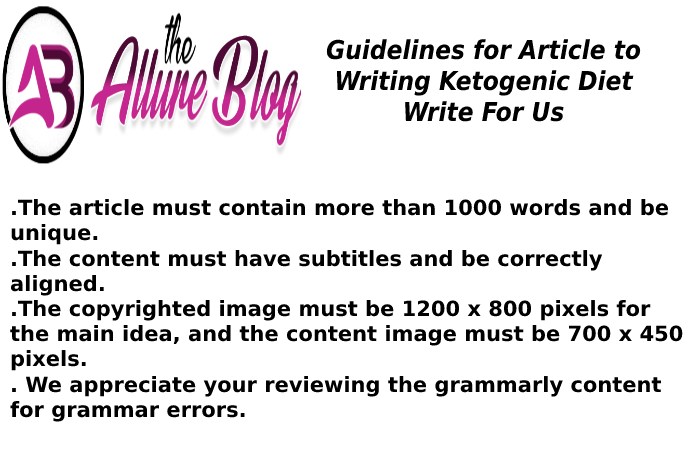Ketogenic Diet Write for Us
 The Ketogenic Diet is a carefully controlled special diet that remains high in fat, low in carbohydrates, and moderate in protein. The word “Ketogenic” means that a chemical, called ketones, is twisted in the body (Keto=ketones, genesis=production).
The Ketogenic Diet is a carefully controlled special diet that remains high in fat, low in carbohydrates, and moderate in protein. The word “Ketogenic” means that a chemical, called ketones, is twisted in the body (Keto=ketones, genesis=production).
The “long-chain triglyceride diet ” is the typical Ketogenic Diet, which affords 3 to 4 grams of fat for every gram of carbohydrate and protein. The “ratio” in the Ketogenic Diet is the ratio of fat to every gram of carbohydrate and protein combined. The foods that are fat sources on the Ketogenic Diet are butter, heavy cream, mayonnaise, and oils.
Although both carbohydrates and protein in the diet are restricted, providing adequate amounts of protein is necessary. Preparing the Ketogenic Diet carefully supervised by a Nutritionist, who will monitor the children’s nutrition, is also vital.
Who Should Not Follow A Ketogenic Diet?
There are myths and controversies about the keto diet, but it appears safe for most people. However, three groups of people require special consideration:
- Do you take medication for diabetes, e.g., insulin? Learn more about going keto with diabetes
- Do you income medication for high blood pressure? More information on starting keto with hypertension
- Are you breastfeeding? More information about keto and lactation
If you want more details regarding the benefits and cons depending on your case, you can see our guide. Is a low-carb or keto diet correct for you?
Are you a doctor, or need your doctor to help you with medications on a keto diet? Could you take a look at our guide for doctors?
How does the Diet Work?
Usually, the body uses carbohydrates (sugar, bread, or pasta) as its fuel, but on the Ketogenic Diet, fat becomes the primary fuel. Ketones are one of the possible mechanisms of action of the diet, and there are other theories, such as the stabilization of glucose, adenosine, polyunsaturated fatty acids, and more.
For Whom is the Diet Appropriate?
It is recommended for children with seizures that are refractory to treatment, and that is, they do not respond to several different anticonvulsant medications. Ketogenic has primarily been used in some situations and is particularly recommend for children with Lennox-Gastaut syndrome. It is also suitable for certain types of seizures or epileptic syndromes, being useful for: Myoclonic epilepsy of childhood (Dravet syndrome), Myoclonic astatic epilepsy (Doose syndrome), infantile spasms (West syndrome), Mitochondrial defects, Tuberous sclerosis or tuberous sclerosis complex (TSC), Rett syndrome. And for GLUT 1 deficiency syndrome (GLUT1 DS) and pyruvate dehydrogenase (PDH) deficiency.
How To Start The Diet?
Typically the diet is ongoing in the hospital. The child usually begins with a short or small amount of diet (except water) and is under close medical supervision for 24 hours. The main reason for admitting them to most centers is to monitor for any growth in seizures with diet. Treat hypoglycemia or acidosis (which can occur at the onset of CD), monitor, and improve tolerance, ensure that all medications are carbohydrate-free, and educate the family to maintain the diet at home.
How is the Patient Monitored?
Regular follow-up checks are usually 1 to every three months to monitor growth (weight and height), adjust anticonvulsant medications, and monitor seizure history (frequency and type of seizures). Urine and blood tests are done to ensure there are no medical complications.
Need for Other Supplements
Since the ketogenic diet does not provide all the vitamins and minerals in a balanced diet, the Nutritionist will recommend vitamin and mineral supplements such as calcium and vitamin D, selenium, iron, and folic acid. Many Centers treat children with citrates (e.g., Polycitra-K) to prevent kidney stones. Additionally, many of these Centers use L-carnitine.
How to Submit your Articles
To submit an article idea, please contact us at theallureblog.com with the subject “Guest Post for theallureblog.” After submitting your work, our team will review it, check if the content is unique, and approve it. For sure our publishing team will contact you within 24 hours.
To submit your Articles, you can Email us contact@theallureblog.com
Why Write for the Allure Blog – Ketogenic Diet Write for Us
 Search Related Terms to Ketogenic Diet Write for Us
Search Related Terms to Ketogenic Diet Write for Us
Fast
Regime
Abstinence
Regimen
Crash diet
Dietary regime
Dietary program
Search Terms for Ketogenic Diet Write For Us
looking for guest posts
submit an article
writers wanted
guest posts wanted
submit the post
contributing writer
guest posting guidelines
become a guest blogger
guest post
becomes an author
suggest a post
contributor guidelines
guest posts wanted
Guidelines for Article to Writing Ketogenic Diet Write For Us
 You can send your Article to contact@theallureblog.com
You can send your Article to contact@theallureblog.com
Related Pages
skin write for us
Health Write for Us
Beauty Write for Us
Hair Care Write For Us
Hairstyles Write for Us
Hair conditioner write for us
Health Insurance Write for Us
Multani Mitti Write for Us
Fashion Trend Write for Us
fitness write for us
Eye makeup write for us
Weight Loss Write for Us
Manicure Write for Us
Face Mask Write for Us
Write For Us
Indoor cycling write for us
Smart Watch Write for Us
Spa write for us
Lipstick Write for Us
Rehabilitation Write for Us
Pedicure Write for Us
Braces Write for Us
Plastic Surgery Write for Us
Lip Gloss Write for Us
Lip balm Write for Us
Antiaging Write for Us
Lip Liner Write for Us
Vitamins Write for Us
Hair Color Write for Us
Nail Polish Write for Us
Cosmetic Write for Us
Face Oil Write for Us
Perfume Write for Us
Shoes Write for Us
Face Scrub Write for Us
Eyeliner Write For Us
